Creating an Editorial Workflow for Your Podcast
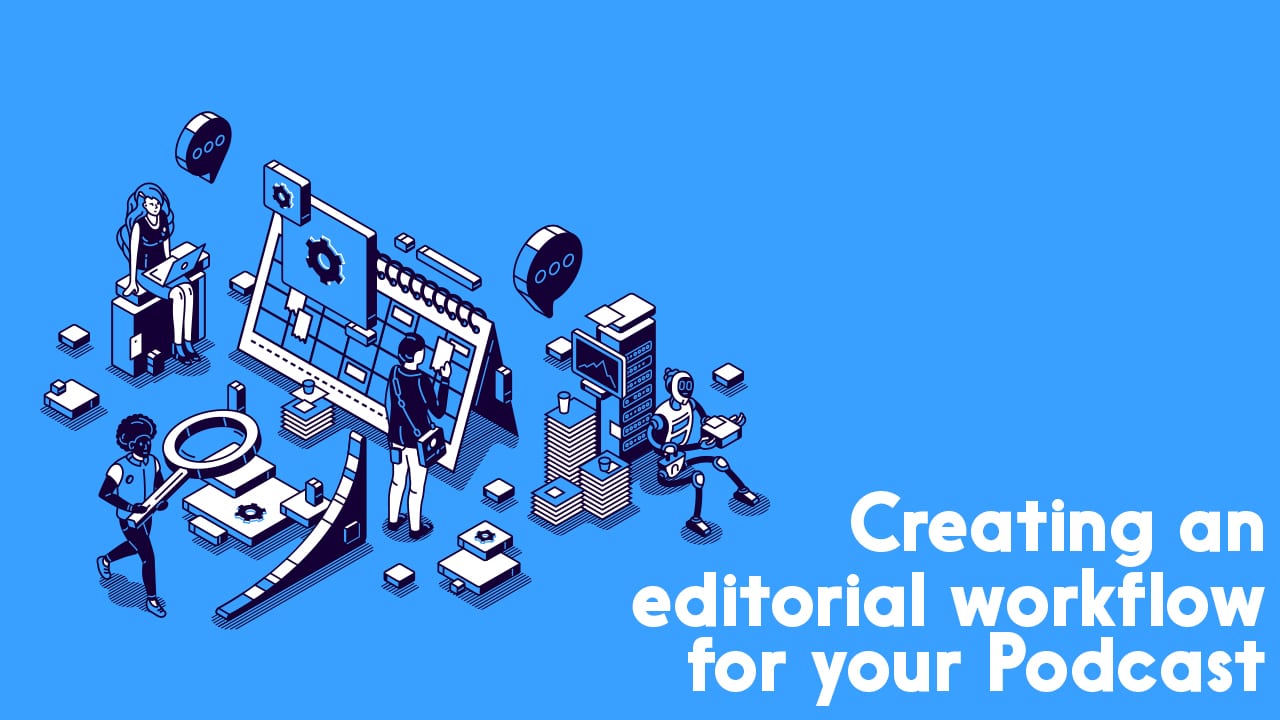
This is a guest post by the guys over at Authority Hacker, who offer actionable education for website owners.
Struggling to publish episodes consistently is something you shouldn’t have to deal with. It’s tiring, and it keeps everyone on edge.
If that rang some bells, don’t worry.
We got you covered.
Here’s a step by step guide on how to optimize the editorial workflow for your podcast, which is bound to make you work more efficiently and increase the reach of your podcast.
Find The Right People To Work With
A podcast can be a one man show.
Hey, as far as we can tell, Joe Rogan (who runs JRE, one of the most downloaded podcast ever) only has one other team member.
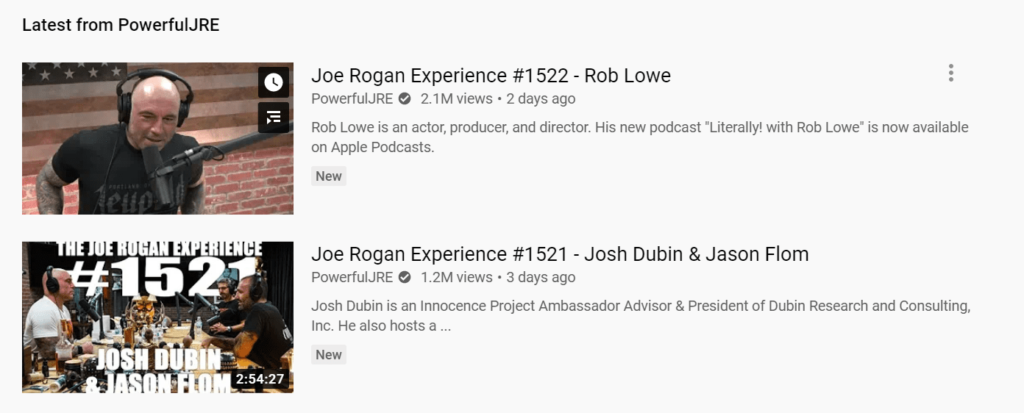
But if you’re not the best at:
- Market research, to see what your listeners want to hear about
- Recording
- Outreach
- Editing
- Scheduling and Posting
- Writing show notes and episode descriptions
You might need to find other people to join your team.
At Authority Hacker for example, we the founders take care of recording the show, and we have separate people dealing with video editing, audio editing, and uploading.
But different shows have different structures for their editorial workflow.
Some of the people in our group, for example, have a different person in charge of:
- Visuals
- Audio editing
- Show notes and uploading
- Promotion of each episode
So it can vary a lot based on what you as the host can take care of. It’s also possible that you can start bootstrapping it in the beginning, and then hire more people along the way based on how well you’re doing.
Regardless, you’ll need to follow some pointers when finding freelancers, or potential employees to work with.
First, you can also use freelancing platforms, but we do recommend only sticking to Upwork, and even then as a last resort – in our experience, we had more success with people that we outsourced directly.
Editor’s note – at The Podcast Host we’ve had a lot of good experiences with Fiverr for freelance work too!
If they can support their freelancing business without a third party intervening, it’s also likely that they can do a better job.
Either way, make sure you check reviews, and even choose certain people by recommendation.
Besides, always aim to start with a small collaboration, and then increase the workload if you’re happy with the service.
Work Out Who’s In Charge of What

Whether you hire someone to help with your podcast, or you adapt your current team to help with a podcast besides their current tasks, you need to delegate responsibilities clearly.
This is important both for accountability, and to improve the efficiency of your workflow.
If you have the same person in charge of uploading and scheduling, they’ll get used to the hosting platform you use and be able to do a better job in the long run.
On the other hand, if you don’t settle on who’s in charge of what from the get go, and you have several people with overlapping or unclear tasks, you won’t work as efficiently, and you won’t make the best out of your podcast.
This is also the best time to define a flow of how work gets done on your podcast.
The person uploading episodes can’t properly do their job without the finished episode.
And the sound editor can’t do their job without your raw recording.
So aim to at least define on paper, if not in a task management software, what’s the flow for your editorial process.
For example, here’s how one of the people in our AH Pro group does it:
The team gets a new raw recording each week, by Friday. The following week, the sound editor needs to clean the audio, the designer needs to create a banner and social sharing content, and then in the second week everything needs to be scheduled by the publisher.

Again, it’s best if you have all of this set-up in a task management software like Asana.
That’s how we do it at AH. We’ll show you our exact process at the end of this article.
Set Clear Deadlines and Milestones
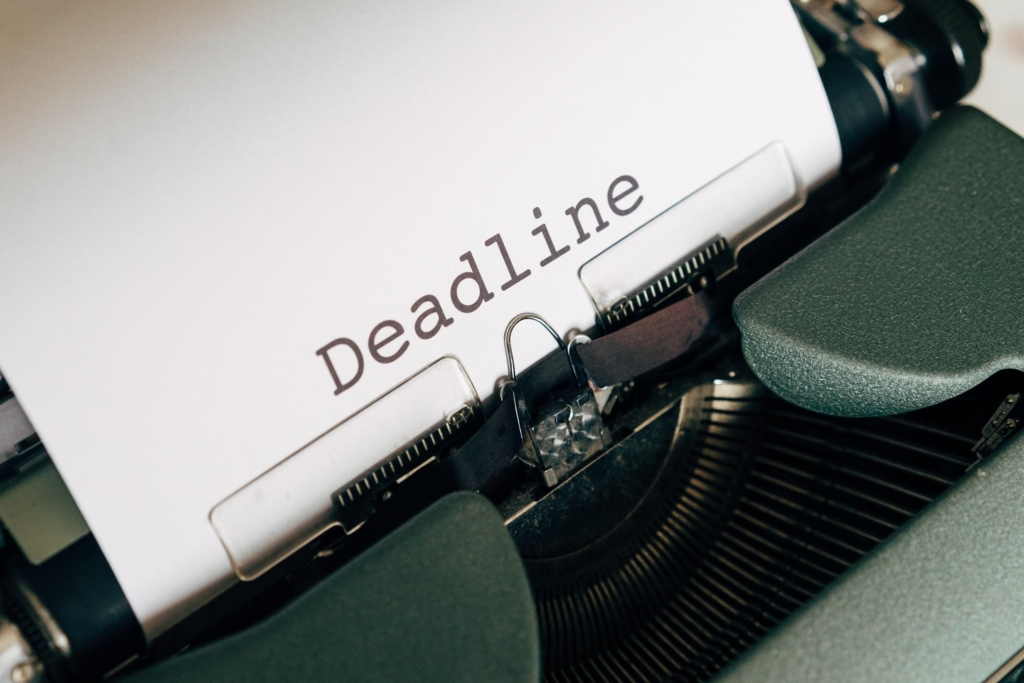
If you tell your employee that they have a week to edit your raw recording, it’s usually going to take a week.
Even if they could have it done in two or three days.
We’re not saying you should push your employees or collaborators – quite the contrary.
Talk with your team and get a clear estimate of how long different tasks take them. If they don’t know for sure, have this discussion again after you publish a few episodes with ballpark estimates.
No matter how you do it, set out clear deadlines for when different parts of the editorial workflow need to be done.
Again, this is both to be more efficient, but also to make sure that everyone is aligned and can actually do their job in the first place.
Besides deadlines, you should also have milestones for your podcast.
Like anything in your business, it’s an effort that should bring in new clients, or at least new streams of income as a media outlet.
It’s hard to get a clear estimate on the number of downloads you should have by a specific date, and it can all vary wildly depending on:
- Your niche
- Your audience
- Your competition
- Your marketing efforts
- The notoriety you already have
- Your format
- Your channels of distribution
On top, while downloads is something often referred to when analyzing the success of a podcast, other things can matter more.
For example, someone may download your last 10 episodes, but only listen to one episode.
Or no episode at all.
So feed count might be a more representative metric.
As you can see, this can get complicated really quickly.
But that doesn’t mean you should forget all about objectives and milestones.
Regardless of how you plan to distribute your show, you can set clear objectives of launched episodes by a certain date.
Milestones help as well – you might not know a date by which you’ll get 10.000 total downloads, but you can definitely prepare for it and celebrate when that happens.
Create The Actual Calendar
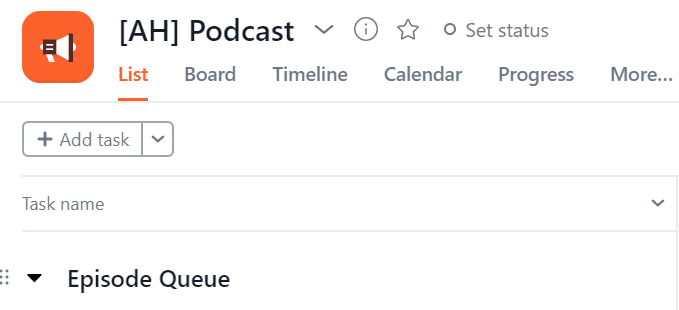
Once you know who’s in charge of what, it’s time to set it all in stone.
Whether you use a spreadsheet, a board in your office, or a workflow in a tool like Trello, you should know in advance what you’ll publish at least for the next two months.
That shouldn’t be too hard, especially if you don’t have speakers invited on your show.
Even if you do, here’s a rule of thumb that works well for any editorial process:
Always plan content in advance.
For our podcast, right now, we have 9 episodes planned in advance, at least in structure and main points.
But we do recommend you take it a step further and actually have everything ready in advance, for the upcoming 2 weeks.
That means at least 2 episodes ready to go if you publish weekly, complete with visuals for social media sharing and descriptions already scheduled on your podcast hosting platform.
It’s easier to work like this than under the pressure of the upcoming episode that needs to be done ASAP.
Sure, you might find a seasonal topic, or you might do minor tweaks to your existing episodes, and then you’ll have to postpone the launch of a specific episode.
But it’s still better to have it planned.
Use The Right Tools
First, communication is important, especially if you work remotely.
So make sure you’re set-up with something like Slack to communicate with your team.
Other than that, we (again) recommend using a task management platform like Asana to plan your editorial calendar. It’s just easier to coordinate everyone with a tool made specifically for that.
Speaking of…
Let’s show you how we’re set-up in Asana.
How We Do Podcast Editorial Workflow
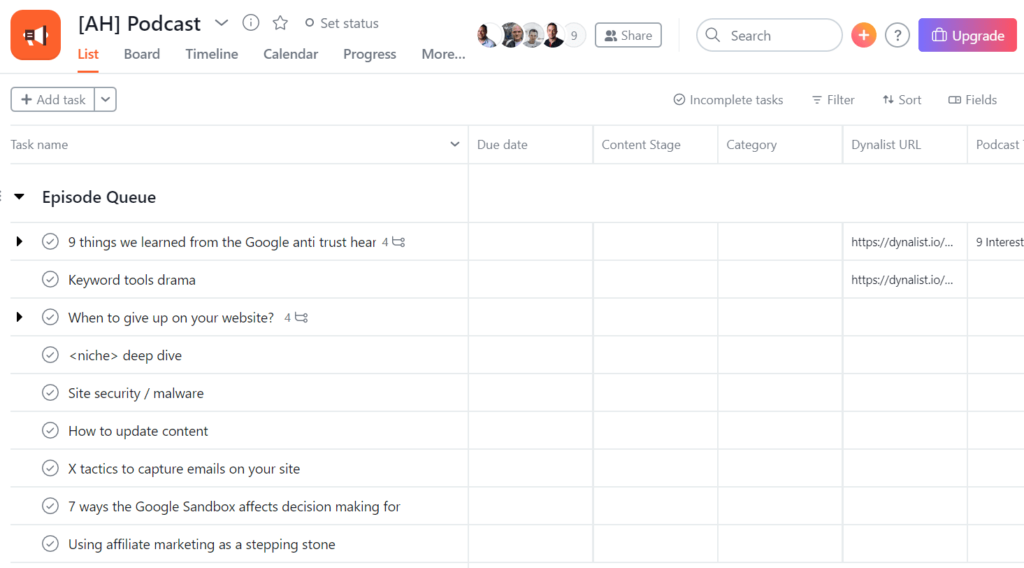
First, we have a queue of all upcoming episodes, which we settle on based on what our audience wants to hear, and based on important events in our niche, or specific topics we want to take a deep dive in.
Each upcoming episode is broken up into specific tasks, all assigned to the person responsible of them, with a deadline of when it needs to be done:
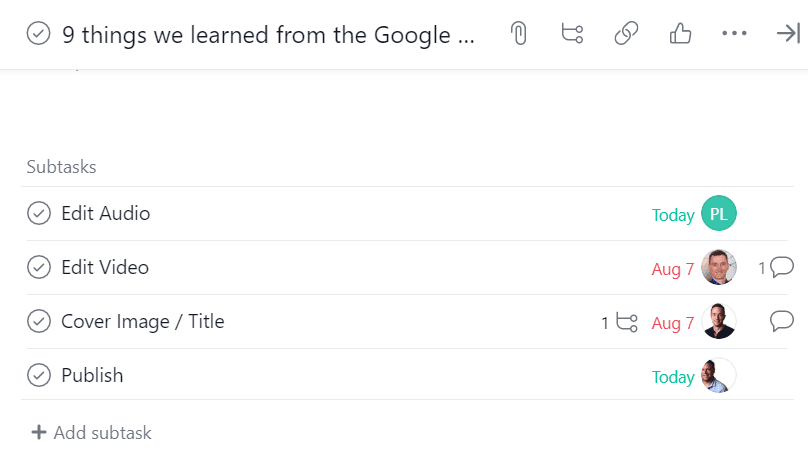
Besides that, we also have a queue for abandoned ideas, since it might serve as inspiration, or we might get back to it when the time is right.
And we also have a queue for ideas on improving our podcast:

That’s not a must-have, but it does help improve your podcast in the long run.
In Conclusion
Creating an editorial workflow for your podcast can seem tiring, but it’s important if you want to work efficiently.
And you can do it if you:
- Find the right collaborators
- Delegate tasks clearly
- Set deadlines and milestones
- Create and share the actual calendar with your team
- Use the right tools to set it all in stone
But that doesn’t mean it’s the perfect recipe.
So we’re curious about what you think: how do you take care of your podcast’s editorial workflow?
If you like what we do, we also just updated our best niches for affiliate marketing list, to match the shifting tides of online business during a pandemic. Make sure you give that a read if you’re curious as to what’s profitable on the net now.
